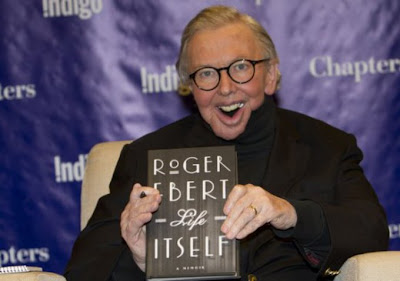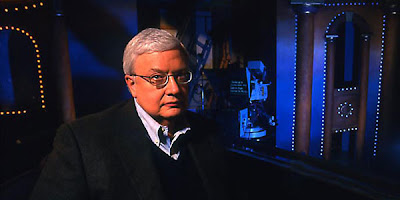I've only known of Roger Ebert's death for an hour, but I can't focus on doing anything else right now, so I might as well write this, raw and unformed and rambling as it may be. So be it.
A couple weeks ago, Ebert stuck my video essay on Clint Eastwood's endings up on his blog. The last time I felt so close to fainting was when Samuel Delany first called me on the phone. (I bet Ebert would have appreciated that. He was, after all, a science fiction fan.) I wish I'd sent him an email to thank him, to say how utterly gobsmacked I was to have somebody who'd been a constant presence in my life suddenly notice something I'd done, and approve it. I was too shy. I knew it was the right thing to do, knew he might even be pleased that his notice meant something to me, but ... I was too shy.
Roger Ebert was always there in my life. Well, not always. I suppose before the age of 10 or 11, I hadn't seen his TV show (one with various names, but I'll forever think of it as Siskel & Ebert), a show that was born the same year I was. In the days before the internet, that show was a lifeline for a kid like me, living in New Hampshire, in love with movies and yet without any easy way to get information about any but the most mainstream and blockbuster. I would watch with a pen in my hand and take notes on which ones sounded interesting. Thus I discovered so many films that I later came to love (or loathe). Often, I had to wait till they were on videotape; sometimes, I was able to see them at a Boston theatre on one of my occasional trips to the city. Who I am as a film viewer was deeply shaped by those years of watching Roger Ebert and Gene Siskel argue about movies on TV.
Truthfully, it wasn't until he lost his voice that I came to love Roger Ebert, though. As my film taste was shaped watching the TV show, I tended to side more with Gene Siskel. Then, once I was in college in New York I was reading film reviews in the Voice and some of the film journals (whichever ones the Barnes & Noble at Astor Place carried: I'd grab a pile, sit in a chair, and read them cover to cover). Siskel and especially Ebert seemed, to a callow youth rather arrogant in his opinionating, utterly mainstream and utterly bourgeois. I suppose I was trying to expel his influence, to kill a father. Such is the nature of callow youths.
Then the Sun-Times put his reviews online. He started blogging. He became Master of Twitter. He expanded his blog to include all sorts of younger critics from around the world. I learned about Ebertfest. I learned about all he had done for film culture in Chicago. I learned.
And though our taste wasn't ever exactly the same, I found I loved reading his reviews. Actually, I liked that our tastes differed, because he was so good at expressing what he appreciated or didn't appreciate, even if my response was the opposite. What I had never known from the TV show was just what a marvelous writer Ebert was. A writer who happened to be a film critic. But a writer first.
Ebert's most interesting reviews aren't just reviews. They do the job a review is supposed to — they tell us about a cultural product we probably haven't yet encountered ourselves, and they give us the writer's take on it — but they are full of tangents, side remarks, bits of fact or philosophy. They are essays in the broadest and most classical sense: moments of thought. The familiar Ebert voice is always there in the words, and it is a comforting voice, an entertaining voice, the voice of a friend or beloved family member, somebody really smart and passionate, somebody you just want to talk to — about anything, really. It's no surprise that when he wrote his memoirs, he did so masterfully. His reviews were also pieces of memoir.
Could one critic ever be so important again? Probably not. The cultural landscape has fragmented, fractured, gone all rhizomatic. Overall, I think that's a good thing. I wouldn't want to go back to those days of having to rely on Siskel & Ebert for all my movie information. I like the easy access to variety today. But still. Roger Ebert, man. We often say a particular death is the end of an era. With Ebert, it really is.
He inspired millions of people to care about movies as something more than just entertainment, but without forgetting that entertainment is central to the experience, that visual pleasure and narrative cinema are nothing to be ashamed of.
Again and again, people have spoken of his generosity, his decency, his humanism. It is remarkable that a man who published three whole books of his most negative reviews could be so beloved! But Ebert wrote wonderful negative reviews. (Even of movies I like!) His generosity of spirit comes through, even as he is saying that a film is utterly awful, a terrible waste of time or effort or talent, even immoral. And when he praised, he praised like a poet.
I learned about one of my favorite movies, David Lynch's Blue Velvet, from the Siskel & Ebert episode where Ebert lambasted it. I wouldn't get to see the film for at least a year after that episode aired, but I remembered it, and I watched the movie while trying to evaluate what I thought of Siskel and Ebert's discussion about it. I decided I completely disagreed with Ebert on it. I still do. And I am utterly grateful to him for what he said, because it provoked me and haunted me and challenged me. There are worse ways to learn about aesthetics and morality, worse ways to learn about yourself.
Neil Steinberg at the Sun-Times chose a perfect quote from Ebert's Life Itself:
“‘Kindness’ covers all of my political beliefs,” he wrote, at the end of his memoirs. “No need to spell them out. I believe that if, at the end, according to our abilities, we have done something to make others a little happier, and something to make ourselves a little happier, that is about the best we can do. To make others less happy is a crime. To make ourselves unhappy is where all crime starts. We must try to contribute joy to the world. That is true no matter what our problems, our health, our circumstances. We must try. I didn’t always know this and am happy I lived long enough to find it out.”Carve those words in stone. Better yet, project them through celluloid.
Tonight, I will choose one of the movies from his most recent Sight & Sound ballot to revisit, probably The General because it would be nice to laugh, and to watch that most graceful of all screen graces, Buster Keaton, my favorite silent film actor.
Thank you, Roger Ebert. All our thumbs are raised high in your honor.
It's two hours now since I learned of Roger Ebert's death.
The signature closing words of Siskel & Ebert are today among the saddest in our language:




